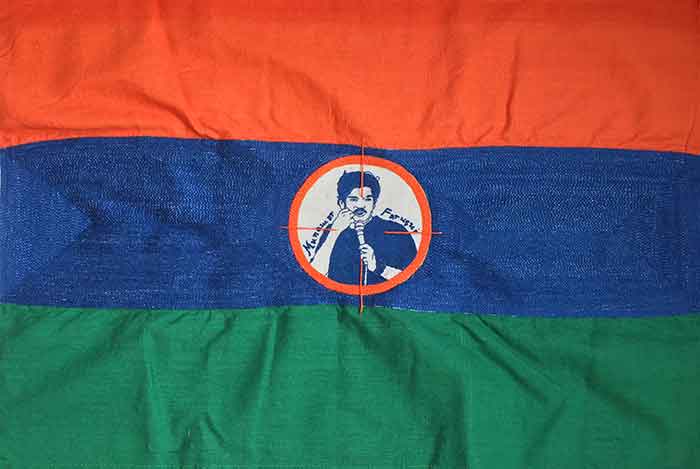by Shivani Das & Sai Thakur

Photo of Stand-up Comedian Munawar Faruqui | Source: Youtube/ Munawar Faruqui Channel
Munawar Faruqui, the Mumbai-based stand-up comedian, hit the headlines when he posted on Instagram ‘hatred won, artist lost, goodbye! INJUSTICE’ after his show in Bangalore was cancelled on the 28th November 2021. The city police cited the law and order situation. So far, 16 shows in a row have met this fate. Reason for the police intervention? The Hindu right-wing organizations have accused Munawar of “ridiculing” Hindu gods and “hurting” their religious sentiments, and the police took action. In fact, in January 2021, he was arrested, apparently, for the “jokes he had not cracked” and had to spend a little over a month in jail.
After the Bangalore episode, people across the board came out in Munawar’s support and defended his right to freedom of expression. But, did Faruqui really insult Hindu gods? The first time Munawar was accused of hurting the Hindu religious sentiments, in April 2020, he stated that he was quoted out of context. He refused to apologize but took down those videos and never repeated those jokes. Munawar makes only two fleeting references to Hindu deities in all ten stand-up videos presently on his YouTube channel.
Does Munawar really ridicule Hindu deities?
In fact, most of his jokes are directed at himself and his community – the lower-class Muslims, to be precise. This self-deprecating humour entertains the audience, and its political sharpness leaves a lasting impression on them. Munawar has lived in Dongri and Nagpada – two infamous Muslim ghettos of Mumbai. They form the markers of identity for him and the substratum for his cult of jokes. Dawood Ibrahim, Haji Mastan, Tiger Memon hail from Dongri, we are told. With his reckless bike riding, the ‘Nagpada rider’, Munawar’s quintessential Muslim youth confuses Yamraj, the Hindu God of death. The quote behind the bike of the Nagpada rider goes “Tumhe kya laga maut ayi toh mar jaunga? Nagpada ka rider hu cut marke nikal jaunga”. (What did you think, if death comes my way I will die? I am a Nagpada rider, I will cut in and escape it (the death)).
The self-deprecating humour mirroring the stereotypes about Muslims is a recurring theme, a remarkable character of his comedy. The stereotypes such as all-Muslims-are-terrorists, Muslim-women-need-rescuing, Muslim-men-have-four-wives are busted quite effectively. He also jokes about the anxieties that Muslim men, and lower middle class/poor men, have to live with. For instance, misplaced ideas about masturbation, which are cashed on by the numerous sex-clinics that dot the cities, become the butt of his joke. The cramped housing and lack of privacy in localities like Dongri and Nagpada add to this. He cracks a brilliant joke about how his family sleeps so close that they enter into each other’s dreams. “I once entered my brother’s dream. He was with his girlfriend” he says.
He poignantly portrays the severity of injustices done to the Muslims without playing the Muslim-as-victim card. For instance, in his first YouTube set, he introduces himself- “Hello. I’ll first tell you about myself… My name is Munawar Faruqui… born in Gujarat… SURVIVED in Gujarat” to which the audience responds with resounding peals of laughter. Without even mentioning the 2002 Gujarat pogrom, he effectively highlights the precarity of being a Muslim in Gujarat to an audience largely comprising Hindus. The sharpness of his political critique haunts the audience’s conscience. When he does mention the Gujarat pogrom, he shows it through the eyes of a 10-year-old Munawar. Reminiscing what happened in 2002 when Gujarat was burning, while the grown-ups were worried about the “what ifs”, he tells us that the young Munawar was elated that he would not have to go to school because there was a curfew. In the process, he and his audience end up laughing at something as gory as a pogrom. The child’s innocence and naivety are pitched against the gruesomeness of the violence through humour.
Though a large part of his comedy is about the Muslims and their lived world, he also critiques Modi and his accomplices, the bhakts, and the ‘godi-media’ which irks the Hindu right-wing. For example, his comparison of the two movies Aladdin and Modi’s biopic PM Narendra Modi, released in India on the same day in 2019. He tells the audience that the Hollywood film Aladdin is the real biopic of Modi. This is hilarious as in this joke Alladin is Modi, Yago the parrot is Yogi Adityanath, and the Jinn is Mukesh Ambani. He abstains from harsh or crude expressions. As a form of humour, stand-up comedy is an art through which Munawar expresses his dissent. But he refuses viciousness, hatred, and violence even against the opponent. He is categorical about his identity as an artist who is against hatred.
Then why does Hindu right find him threatening?
In today’s digital age, content creation and dissemination have become affordable and quicker. No wonder stand-up comedy on digital platforms spreads like wildfire. While live stand-up comedy on stage is a one-time laughter material for the audience, videos of it when posted online can be re-watched multiple times by the same audience. This would have a trickle-down effect. As a result, though Munawar has followers among the niche elite audience of Anglophone stand-up comedy also his audience is not restricted to them. A sizeable proportion belong to the lower middle classes. His humour effectively draws attention – of the Hindus and not just Muslims – to the absurdity of the doings of the Hindu right. Munawar’s audience smell of sweat, dirt and squalor and share the same anxiety of ‘what are we to face next?’ For Faruqui’s audience, he is not a larger-than-life celluloid hero; he is one of them, a relatable figure. He puts the bittersweet reality on their table, and the audience laps it up ravenously. This is the reason for the meteoric rise in his popularity. In the current atmosphere of intolerance and Islamophobia, this is daredevilry, indeed. He belongs to the masses, he can do too much damage.
In a February 2021 video after his release from the Indore jail, he apologizes, not for his jokes, but a typo error in the video’s title – “Munawar Faruqui Leaving Comedy”. He explains, “I am not leaving comedy, I am living comedy”. Munawar held a show in Kolkata, Mumbai in December 2021. And he had announced more shows in Pune and Kolkata. Munawar Bhai, that’s the spirit. Hatred can never win, and a true artist can never lose. Please don’t say goodbye to comedy, say goodbye to injustice.
Bio of the Authors:
Shivani Das is an Analyst at Mythos Labs
Sai Thakur is Assistant Professor, Center for Study of Social Exclusion and Inclusive Policy, Tata Institute of Social Sciences, Mumbai













































